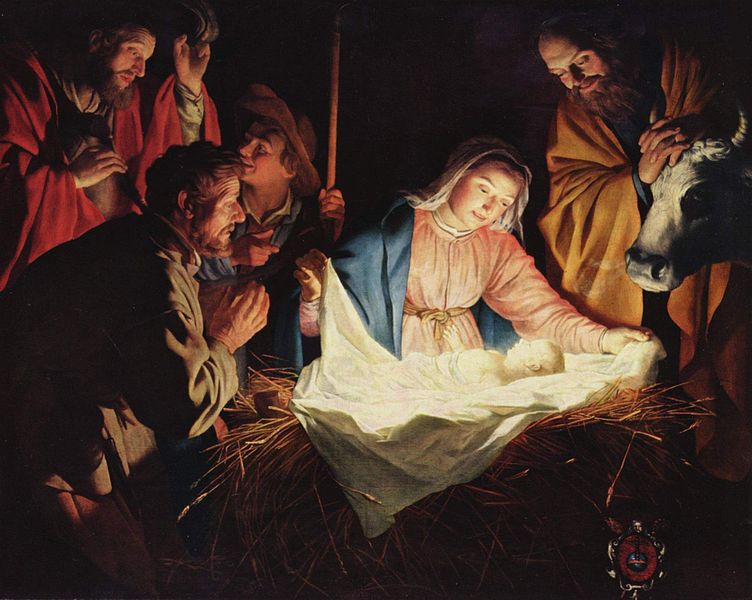 Around this time of year, there comes a recurrent debate about what people are ‘really’ doing when they celebrate Christmas. A while ago, there was a programme on Radio 4 exploring the origins of the tunes of carols. For example, the tune for Good King Wenceslas was originally a spring carol celebrating the fertility of nature. It is also commonly claimed that at Christmas we are ‘really’ celebrating Saturnalia, a Roman/pagan winter festival during which conventional social decorum was abandoned.
Around this time of year, there comes a recurrent debate about what people are ‘really’ doing when they celebrate Christmas. A while ago, there was a programme on Radio 4 exploring the origins of the tunes of carols. For example, the tune for Good King Wenceslas was originally a spring carol celebrating the fertility of nature. It is also commonly claimed that at Christmas we are ‘really’ celebrating Saturnalia, a Roman/pagan winter festival during which conventional social decorum was abandoned.
The renewal of light and the coming of the new year was celebrated in the later Roman Empire at the Dies Natalis of Sol Invictus, the “Birthday of the Unconquerable Sun,” on December 25.
(This is not actually true. For one, Christmas was not a Big Thing in the early Christian Era; celebrations focussed more in Epiphany. For another, the first time the date of Sol Invictus is mentioned as December 25th is in the Philocalian Calendar in 354—the same place where Christmas is first mentioned at the same date. It looks like the pagans were muscling in on the Christian festival, rather than the other way around! In fact the calculation originates from the belief that prophets died on the date that they were conceived, which gave the early church the date of March 25th for Jesus’ conception, and a crude counting on of nine months gives December 25th for the birth.)
I have heard it commented that when we put up a Christmas tree, we are ‘really’ participating in a pagan fertility rite, bringing something living indoors to counteract the death-dealing cold of winter. This idea of what we are ‘really’ doing has been given a positive spin at times, arguing that when people write ‘Xmas’ they are ‘really’ echoing the early Christian use of the Chi-Rho monogram, which stands for the name of Christ—they just don’t realise it.
But of course it is all nonsense. People aren’t ‘really’ doing things that they don’t know about—they cannot be. This is what is known as the ‘genetic fallacy’—thinking that the ‘meaning’ of things resides in their origin. If I describe my wife as a ‘lady’, I am not suggesting that she kneads dough, even though that is where the word comes from. When someone comments that a friends of theirs is a ‘law unto themselves’, they are not in fact quoting St Paul (Romans 2.14) nor making use of his argument that our consciences themselves demonstrate that there is an objective sense to right and wrong. (They usually mean precisely the opposite!) Neither is the church composed of ‘called-out ones’ because the Greek word for ‘church’ is ekklesia which comes from ek and kaleo. (If you have not heard this argument before, just be thankful.) The meaning of words is related to their use, and not their origins.
So what are people ‘really’ doing at Christmas, as they participate in the customary social rituals?
Well, firstly, they are doing just that: participating in customary social rituals. Conforming to repeated social rituals is a powerful thing, and it has the potential to give security and bind people together. We are not so much homo sapiens as homo liturgens; ritual patterns are more important to us than we often realise. If you don’t believe me, go to a football match. Or try to change a church tradition. Or ask Canon Simon Tatton-Brown who ‘ruined’ a whole school-full of children a few year ago by telling them that Santa was ‘really’ St Nicholas. Even the bad jokes in Christmas crackers function to ‘bind people together’—and that is why they are so bad. If they were better, someone would not get the joke, and then they would be left out. And that gives another important insight into these rituals—anything that binds one group together is sure to leave others out. And if you don’t believe that, ask anyone for whom Christmas reminds them of a bereavement, or for whom their ‘family’ is not the one they wanted.
In our context in Western Europe, it is worth noting that shared rituals become more important when we have fewer other things in common. I think that is why some ‘traditions’ are defended with real animosity at times—these things are our last bastion for a sense of common humanity.
Secondly, these rituals express deep human needs. As the nights close in, and the days shorten, we long to see light. As the winter gets colder, we long for warmth. As nature around us seems strangled by death, we need signs of hope and life. And as the inconvenience of going out gets greater, and we are more isolated from friends and neighbours, we long for company. Recent scientific research on sleep and the circadian rhythm has also highlighted how connected we are with the natural world around us. As anyone who is a gardener or a farmer will know, the fallow period of winter is actually an important season of dormancy and preparation for spring, and the bare trees and brown fields are a powerful sign of the need for different seasons in our lives.
These are all natural human longings, and many of the rituals of Christmas are designed to meet these needs. That is why Saturnalia came to be celebrated in mid-winter, and that is why it worked very well to celebrate Jesus’ birth at this time of year, displacing other winter celebrations rather than simply trying to get rid of them. Who can bring us light but the light of the world (John 8.12)? Who can bring us warmth but the one who has poured God’s love into our hearts (Rom 5.5)? Who gives us hope beyond death, but the one who not only tasted death for us but swallowed it up in victory (1 Cor 15.54)? And who else can bring us into friendship with God (2 Cor 5.18–19)?
That leads to the third truth about Christmas: these rituals have, at certain key moments, been taken over, ‘Christianised’ if you will, and in a polemical way. The Christian Christmas season is doing something with time that the erection of church buildings in traditional sacred places did with space. The reason why we are not celebrating Saturnalia is that the festival now points to (what Christians believe) is a truer reality. Within this there are two dynamics going on. One is the recognition that the questions being asked are real questions which need real answers. But the other is that there is also tension, present in the conflict of beliefs about where we find trustworthy answers to these questions. It took courage, strength and a struggle to transform traditions in the past, and will take similar qualities if we are to bend contemporary traditions in the same way today. We need to do this if we are to rescue people from the all-pervading narrative of salvation by shopping that our culture runs on. It is a narrative that fails to deliver, because it cannot give the light, warmth, hope and friendship we need.
So the fourth thing people are doing at Christmas is putting themselves in a place of opportunity—opportunity to ask important questions and find dependable answers.
The task of Christian ministry at this time of year, it seems to me, is to make the most of those opportunities in a way which builds bridges and opens doors.
There are a good number of well-made videos around online which have been to tackle this task of building bridges and communicating the Christian message of Christmas. Do post links to your favourite in the comments. I still like this one, from some years ago, by evangelist Glenn Scrivener, because I think it does a good job of building on a common narrative to ask pertinent questions:
And I never failed to be amused and impressed by Milton Jones’ reflection on the meaning of Christmas.
‘Jesus of course was a very humble man, who said ‘I am God’. So, er, either he was God, or he wasn’t.’
How can a man say so much in so few words?
(An earlier version of this article was first published in December 2013)
If you enjoyed this, do share it on social media, possibly using the buttons on the left. Follow me on Twitter @psephizo. Like my page on Facebook.
Much of my work is done on a freelance basis. If you have valued this post, would you consider donating £1.20 a month to support the production of this blog?




























I try and collect the latest videos each year here: http://thathappycertainty.com/culture-music-film/christmas-advent-videos-2019/
Thanks!
Thank you for this piece, Ian.
“Mary Bursting”
While not a video, but touching on some of the points you raise, and the recent Glenn Scrivener Gospel Coalition article which draws in the Trinity, here is an article, which reads more like a breathless, bursting, Christmas- gospel sermon, coming from a perhaps surprising quarter. I have not come across the writer before –
https://canonpress.com/blogs/journal/mary-bursting
If you permit, yes, it is an interjection to your piece, Ian, but I trust it doesn’t detract as it is all part of the multi-faceted diamond- like gospel.
May we all rejoice and burst forth together.
the fallow period of winter. This shows a northern origin for Christmas. What do the southerners think of this?
The writer is addressing his audience. Perhaps it can be adapted without too much thought for Southern audiences. I could think of a couple of adaptations, but would need to know the culture, such as Australia at the present time.
Come on Bob, burst forth.
Ye, my comments about the symbolism of winter obviously apply to my own, north hemisphere, context. I know nothing about the importance or otherwise of Christmas in the south.
I experience the heat of Summer in Australia as the survival time. The land is dry, plants die, animals and birds and humans long for temperatures to cool. It seems to me that the Northern Hemisphere winter and the summer here coincide bringing a time of gasping, longing, and hoping for respite.
I have long thought of the solstii as the posts at either end of a metaphorical hippodrome, around which the horses pulling the chariots of weather are turned. Thus far shall you go and no further, return toward the moderating influence of the other end.
I marvel that the earth has such a cosmically narrow range of habitat and temperatures that humans have found ways to make livable, and I grieve that in our greed and blindness in worshiping money we are seemingly do all we can to destroy that.
Bob,
If you are referring to the article I linked or Ian has written above or a slightly earlier one, they are written for the audience.
Surely, it doesn’t take too much thought to adapt it for a Southern culture, such as Australia at the present time, I could think of a couple of adaptations but as I’m not part of that culture, don’t know, nor have experienced it, I’m not best placed.
In fact the whole article shows a thoroughly biblical view of Christmas, of Hebraic/Christian middle eastern culture/climate.
And yes it is a Christian celebration, whether it is to be categorised as northern origin or not
Come Bob – burst forth. Deep down,you really know you can’t contain yourself.
Bob,
Jesus, burst forth in fulfilment, in “first fruitfulness” , a Last Adam, from the “woman”,( as Jesus later emphasised) that is, his mother Mary, after a “fallow”, arid , period of 400 years in biblical history.